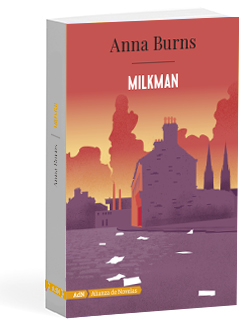

My mother, who grew up in one of the “impossibly tiny houses” mentioned in the novel, observed the stroke of genius contained in the book’s very title, an in-joke that is never made explicit, though it is clear in Burns’s previous work No Bones: the IRA delivered petrol bombs in milk-crates to doors at the corner of each street. A British army manual referred to it as “an interface on the total perimeter” of the city, showing that Burns’s classifications have a precedent in the jargon of the conflict, in which the evasions of code were a tactic on all sides. Before the Troubles a socialist and not a nationalist stronghold, it is isolated geographically from other predominantly Catholic areas of Belfast.


Ardoyne, where Anna Burns is from, was always an anomalous yet sharply-defined district. While that may be true, those who know the place in which it is assumed to be set, and who-presumably like the author-have some degree of distance from it, recognize a reality that is encapsulated by the absurdist-generic names rather than transcended by them. Reviewers have seen its erasure of names as an ascent to “universalism”, a portrayal of any “totalitarian” society at any time, anywhere. Yet beyond all these fully justified plaudits, Milkman needs to be recognized as a book that sounds the soul of the people and the place it portrays. Heralding its originality, its humour, its charm and seductiveness, as well as its bewitching “strangeness” and “eccentricity”, critics cite a series of forbearers that any author would be proud to claim, among them Swift, Sterne, and most frequently, Beckett.Īnna Burns with the cover of her novel Milkman, which has been shortlisted for the 2018 Man Booker Prize. They laud its humanism, its condemnation of tribalism and inner-community surveillance and control, as well as its attention to the still underplayed dynamics of gender inequality during the Troubles, in particular women’s vulnerability to a predatory violence at once psychological and physical. Reviews have praised the effectiveness of its most notable characteristic: the erasure of specific names in favour of a surreally generic set of signposts. Whatever the result of the deliberations of the Man Booker Prize judges on Tuesday, the extent of the achievement represented by Anna Burns’s Milkman in Irish literature should continue to be hailed and celebrated.


 0 kommentar(er)
0 kommentar(er)
